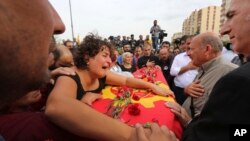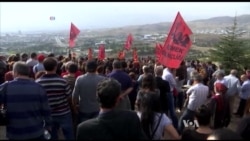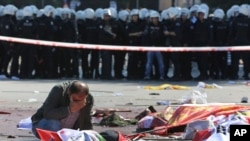Thousands of people took to the streets of Ankara Sunday, many of them chanting slogans against the Turkish government, as the country mourned the victims of twin bombings at a peace rally that killed at least 97 people.
Thousands more marched in the mainly Kurdish southeastern city Diyarbakir.
The government reported that 160 people wounded in Saturday's twin blasts were still hospitalized, with 65 of them in intensive care at 19 hospitals.
No one has claimed responsibility, but analysts say the bombings bear similarities to two suicide bombings in July near the Syrian border that killed 33 people. Islamic State extremists later took credit for those attacks.
'Heinous attack'
Turkish President Recep Tayyip Erdoğan condemned the blasts -- the worst such violence in Turkish history -- as a "heinous attack on our unity and our country's peace."
Erdoğan also canceled three days of appointments as his nation grieved, but by late Sunday had not yet addressed the public.
WATCH: Related video by VOA's Zlatica Hoke
Critics, including Selahattin Demirtas, the co-chairman of Turkey's pro-Kurdish party, blamed the government for the explosions, accusing security forces of failing to protect the peace rally.
In an address to mourners, Demirtas said, "The state which gets information about the bird that flies and every flap of its wing was not able to prevent a massacre in the heart of Ankara."
The Hurriyet Daily News headline called the attack "A bomb into our hearts." It added, "The deeply outraged public is waiting to find out who is behind the incident."
Prime Minister Ahmet Davutoğlu declared three days of national mourning.
The blasts occurred near the main exit of the railway station in the Ulus district.
The French news agency AFP, reporting from the attack site, said the grounds were littered with ball bearings, virtually guaranteeing the blasts would cause maximum casualties.
Calls for unity
U.S. President Barack Obama offered Turkey official U.S. condolences.
Hours after the attacks, a White House statement said Obama also conveyed "his deepest personal sympathies," and sought to extend assurances that "Americans stand in solidarity with the people of Turkey in the fight against terrorism."
Davutoğlu called on his nation to unite and act against terrorism, saying there are indications two suicide bombers carried out the blasts.
But the prime minister’s appeal for calm and unity fell on deaf ears.
Lawmakers from the ruling AKP political party took to Twitter and other social media sites Sunday to claim the bombing was the conspiratorial handiwork of Kurdish separatists aimed at making the government look bad.
Others accused the pro-Kurdish HDP party of bombing their own supporters in an effort to boost its electoral appeal ahead of elections set for November 1.
None of the accusers have produced any fact-based evidence for their claims – not a standard requirement in Turkish politics, which thrives on conspiracy theories.
But the failure of the government to get to the bottom of a string of bombings in southern Turkey the past three years hasn't helped to stop speculation about who might be behind the terrorism, analysts said.
Cease-fire
The PKK announced after the bombings Saturday that it is ordering its fighters to curb militant activities in Turkey and only respond when they come under attack from Turkish forces.
But Turkey said its warplanes struck Kurdish targets in northern Iraq and southeastern Turkey on Saturday and Sunday, killing 30 or more Kurdish fighters.
The Turkish government used the July border bombings at Suruç to justify launching airstrikes against Kurdish militant positions in northern Iraq and Syria, arguing it needed to combat all terrorist groups, Kurdish and Islamic.
The airstrikes ended a four-year-long peace process between the PKK and Ankara.
Coming just weeks away from next month’s parliamentary elections, Saturday’s bombings will likely add to a sense of foreboding across a country fearful of more spillover from the war raging in neighboring Syria and the clashes in southeast Turkey between Turkish forces and PKK militants.
WATCH: Related report by VOA's Luis Ramirez









